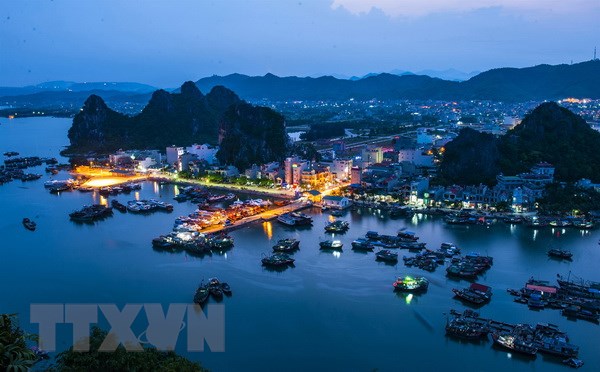
The arrival of the 15 millionth foreign visitor of 2018 in Ha Long city, in the northern province of Quang Ninh, marks a successful year for the tourism industry.
A corner of Van Don island district of Quang Ninh province
(Photo: VNA)
This year, the country
is estimated to serve some 15.5 million-15.6 million foreign tourists and 80
million domestic travellers, generating 620 trillion VND (26.66 billion USD) in
tourism revenue.
The number of international tourist arrivals surged three-fold from 5 million
in 2010 to over 15 million in 2018. The remarkable growth reflects the great
efforts made by all players in the sector, particularly the large network of
local travel agencies and strategic tourism investors nationwide.
The success has also been attributed to the large-scale and intensified efforts
of tourism authorities to promote the country overseas. To aid such efforts,
the Vietnam National Administration of Tourism (VNAT) has adopted a system of
indicators to evaluate a destination and a tourism code of conduct; designed
various plans to strengthen the management of travel agencies and tour guides;
and raised awareness of the importance of quality among tourism service
providers, local administrations, and tourism authorities.
According to the VNAT, to meet the demands of visitors from different markets,
Vietnam has developed a diverse range of tourism products that make use of the
country’s advantages, including cultural tours, sea-based tours, eco-tours,
adventure tours, luxurious resort vacations, and more.
In recent years, a range of popular holiday destinations like Ha Long, Phu
Quoc, and Da Nang have helped develop the popular imagery of Vietnam, promoting
the national tourism among international visitors and becoming the main drivers
of the industry’s growth.
Also this year, the country has won a series of international awards,
recognising it as a safe and friendly destination. Vietnam was named the
"Asia’s Leading Destination” for the first time at the 2018 World Travel Awards
in Hong Kong this September. Two months later, it was honoured with the title
of "Asia’s best golf destination in 2018” at the Golf World Travel Awards.
In 2019, Vietnam expects to welcome some 103 million visitors, including around
18 million foreigners and 85 million domestic travellers, up 15 percent and 6
percent, respectively, from 2018.
Early December, Prime Minister Nguyen Xuan Phuc approved the establishment of a
state-run tourism development fund, worth about 300 billion VND (12.9 million
USD), which will be used for building plans, financing tourism promotion
activities, and boosting the tourism growth.
The PM has also given nod to a project which looks to restructure the industry
in an attempt to turn it into a spearhead economic sector and make Vietnam one
of the most developed tourism nations in Southeast Asia.
The project has set a target of 45 billion USD in tourism revenue by 2025, with
exports through tourism reaching 27 billion USD.
The sector is hoped to contribute more than 10 percent to GDP and create 6
million jobs, including 2 million direct jobs. At the same time, it expects to
serve 32 million foreign tourists and more than 130 million domestic visitors
in 2025.
Source: VNA
Da Bac district has pinpointed culture as a key driver of tourism development, a direction clearly outlined in the Resolution of the 25th district Party Congress for the 2020-2025 tenure.
Go Lao waterfall in Go Mu hamlet, Son Thuy commune, Mai Chau district is a hidden gem of the northern mountainous province of Hoa Binh.
In the first 9 months of 2024, Hoa Binh province continues to implement the expanded tourism development cooperation program plan of 8 Northwest provinces with Ho Chi Minh City; deploying digital transformation content in tourism and developing a smart tourism province. Hoa Binh province received about 3.6 million views, an increase of 7.9% over the same period. In which, international visitors are about 380 visitors, domestic visitors are estimated at 3 million 220 visitors.
Spanning thousands of hectares and winding gracefully along mountain slopes, hillsides, and riverbanks, the terraced rice fields of Lac Son District present a stunning and captivating beauty. This region, renowned for its remarkable terraced landscapes, is also the centre of Hoa Binh Culture known for numerous archaeological sites.
The life of Mong people in Hang Kia and Pa Co communes of Mai Chau district has improved much thanks to tourism development.
The man-made Hoa Binh Lake, with a water surface area of approximately 9,000 hectares and a capacity of 9.45 billion cubic meters, stretches over 200 kilometers from Hoa Binh to Son La provinces. With the goal of developing into a national tourism area, the Hoa Binh Lake tourism area is expected to not only become the largest tourism centre in the province but also one of the 12 key tourist destinations in the northern midland and mountainous region of Vietnam.



